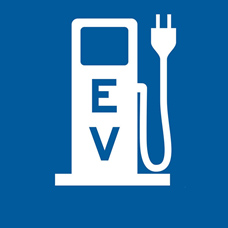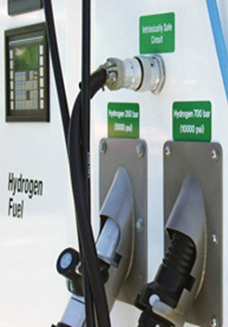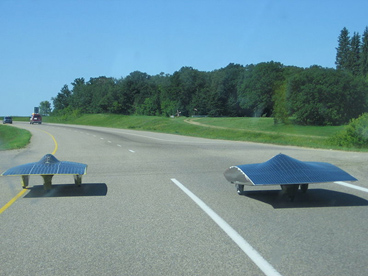Short History on Electric Cars
The History of the Electric Vehicle
 Electric vehicles (EV), those that use electric motors instead of gasoline motors, have become very popular. Those who strive to protect the environment and go green love electric vehicles. But many would be surprised to learn that the EV isn’t a new invention. While history is uncertain about who actually created the very first EV, what is certain is that there were electric motors in use as far back as the early 1800s. One known electric motor was created in 1828 by Anyos Jedlik. He made a small model car that could move on its own via a small electric motor. Sometime between 1832 and 1839, a larger electric motor created by Scottish inventor Robert Anderson was used to drive a carriage.
Electric vehicles (EV), those that use electric motors instead of gasoline motors, have become very popular. Those who strive to protect the environment and go green love electric vehicles. But many would be surprised to learn that the EV isn’t a new invention. While history is uncertain about who actually created the very first EV, what is certain is that there were electric motors in use as far back as the early 1800s. One known electric motor was created in 1828 by Anyos Jedlik. He made a small model car that could move on its own via a small electric motor. Sometime between 1832 and 1839, a larger electric motor created by Scottish inventor Robert Anderson was used to drive a carriage.
Of course, while these EV didn’t exactly gain widespread use, they did spark the imaginations of others. In 1835, two small-scale EVs were created, one in Holland and one in the United States by Thomas Davenport. Davenport and would later create the first electric car to run on batteries, although these batteries were non-rechargeable and were unable to give the car much range. Others, including French inventor Gaston Plante, worked on better batteries, but still fell short of a practical vehicle.
In the early 1900s, American inventors return to the EV. Around this time, William Morrison created what many consider the first practical electric car, although it still lacked range. Hybrids were also created during this time to solve a number of issues with the EV.
- Wikipedia’s History of the Electric Vehicle – This article discusses the early years, decline, and revival of the electric car.
- Timeline of the Electric Car– PBS has compiled an easy to read timeline of the EV.
- HowStuffWorks “The First Electric Car”– Learn about some of the earliest electric cars.
- The 100-year History of the Electric Car – A timeline created by NPR.
Today’s Electric Vehicles
 Today, electric vehicles are more popular than they’ve ever been, and many are capable of driving fairly good distances on their batteries. The Tesla Roadster became available in 2008. While far from perfect, it was able to cover more than 200 miles on one charge of the battery. It was followed fairly quickly by the Mitsubishi i-MiEV in Japan. The development and release of these two vehicles, but especially of the Tesla, marked the beginning of the modern EV period
Today, electric vehicles are more popular than they’ve ever been, and many are capable of driving fairly good distances on their batteries. The Tesla Roadster became available in 2008. While far from perfect, it was able to cover more than 200 miles on one charge of the battery. It was followed fairly quickly by the Mitsubishi i-MiEV in Japan. The development and release of these two vehicles, but especially of the Tesla, marked the beginning of the modern EV period
Other major car companies quickly began working on their own electric cars. Many already produced hybrids, so the technology was already widespread. GM released the Chevrolet Volt, while Nissan released the Leaf, an all-electric five door hatchback. However, much like the Tesla, the major developments in EV are coming from smaller companies. The Better Place network created the first EV with a swappable battery.
There are a number of reasons to buy an EV. The engines are very quiet, and the ride is very smooth. They actually have a higher torque than most people expect, too, because the power is sent straight to the wheels. There’s no need to visit a gas station, either, and while drivers do have to pay for the electricity used in charging the car, it’s less than gas prices.
On the downside, EVs are not for everyone yet. Most are limited to about a 100 mile range, and it often takes about an hour of charging for one vehicle to travel 25 miles. EVs are also quite expensive, although Tesla is working on one that will be around $20,000. The lack of a diverse market leaves few choices for consumers, too.
- Electric Cars Pros and Cons – – A good list of the pluses and negatives of an EV.
- Bankrate’s Pros and Cons List – – A quick look at the pros and cons.
- The Good, the Bad, and the Green –– A look at EVs from a sustainable point of view.
- EVs: 3 Pros, 3 Cons – – A list by InvestorPlace.
- Pros and Cons of Electric Cars – – Another article weighs in on EVs.
Alternatives to the Electric Vehicle
 While EVs are quite popular, they may not be for everyone. There are some alternatives to electric cars that may interest some drivers. The electric scooter or moped, for example, provides some of the same benefits of an EV with a much smaller price tag. Riders can also make use of the bike lane and don’t have to worry about parking. Of course, it doesn’t do well in the rain.
While EVs are quite popular, they may not be for everyone. There are some alternatives to electric cars that may interest some drivers. The electric scooter or moped, for example, provides some of the same benefits of an EV with a much smaller price tag. Riders can also make use of the bike lane and don’t have to worry about parking. Of course, it doesn’t do well in the rain.
Some companies are experimenting with using solar panels as a way to charge EVs. They have looked at placing solar cells directly on vehicles or on vehicle charging stations. While this is still a type of EV, the use of solar cells instead of plugging in means the car can charge whenever it’s in sunlight, alleviating some of the battery life issues.
Hydrogen is a potential alternative fuel source that a number of companies are currently researching. It’s emissions-free and is most often created by using a technique known as steam reformation. This transforms methane into hydrogen. Currently, most of this hydrogen is used in refining petroleum and processing foods, but it has been used as a power source in space flight for decades.
There are a number of other alternative fuels currently being studied. The Energy Policy Act of 1992 lists fuels such as Biomethane, drop-in biofuels, and biobutanol as potential fuel sources. However, while they have been used to power a vehicle, much more research and development is needed before they become commercially viable power sources.
- The Basics of Hydrogen Fuel – A summary of using hydrogen as fuel by the U.S. Department of Energy.
- Hydrogen Fuel Cells – How this energy source works
- Emerging Technologies – This article discusses many different alternative energy sources for both vehicles and other uses.
- Hydrogen and Fuel Cells – – A look at producing and using hydrogen.
The Future of EV
 While the future of EVs may have been debatable ten years ago, it’s obvious that they’re now here to stay. However, there’s some question as to what kind of form EVs will take in the future. Many people still cite the high cost and low range as the reason why they haven’t purchased an EV. That may change, though, as the market becomes more competitive. In 2014, Tesla released all of their patents on their EV technology. This means any company that wants to use or improve upon Tesla’s electric motors is free to. CEO Elon Musk said the company hopes others will see ways of improving on their technology, which can only benefit the EV industry and the average customer
While the future of EVs may have been debatable ten years ago, it’s obvious that they’re now here to stay. However, there’s some question as to what kind of form EVs will take in the future. Many people still cite the high cost and low range as the reason why they haven’t purchased an EV. That may change, though, as the market becomes more competitive. In 2014, Tesla released all of their patents on their EV technology. This means any company that wants to use or improve upon Tesla’s electric motors is free to. CEO Elon Musk said the company hopes others will see ways of improving on their technology, which can only benefit the EV industry and the average customer
Experts in the field expect vehicles to easily get 400 miles to a charge within 10 years, while others believe that the cost of the lithium-ion batteries used in most EVs will decrease to the point that the vehicles are much more affordable.
However, many auto manufacturers aren’t quite ready to give up on gas. Because the average driver is much more comfortable and familiar with gasoline-powered cars, many aren’t ready to lose their safety net. The allure of cheap fuel is tempting to many, though, which is why hybrids are selling very well. This transitional vehicle is likely to continue to become more and more popular, especially as mileage increases.
- What is the Future of Electric Vehicles – The Motley Fool website asks if EVs can truly compete against gasoline-powered vehicles.
- Tesla Opens All Patents – An article from CNBC on the Tesla announcement.
- Experts Split on the Future of EVs – A discussion of the electric car’s future.
- The Electric Car’s Biggest Threat May Be Its Battery – A look at the changes that may be coming in regards to battery life.
- Why Electric Vehicles Will Rule the Road – A Wall Street Journal blogger bets EVs will be the future.

Matt Robertson
